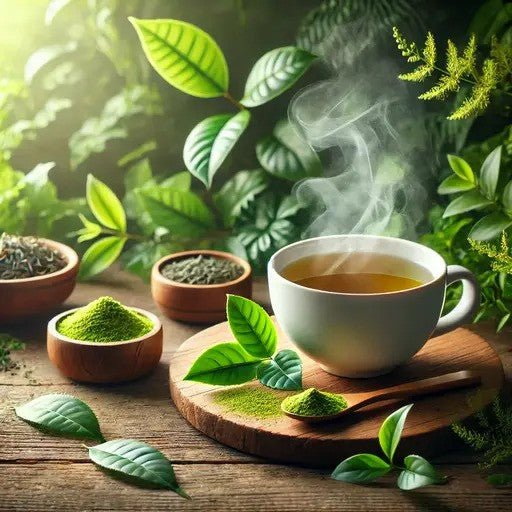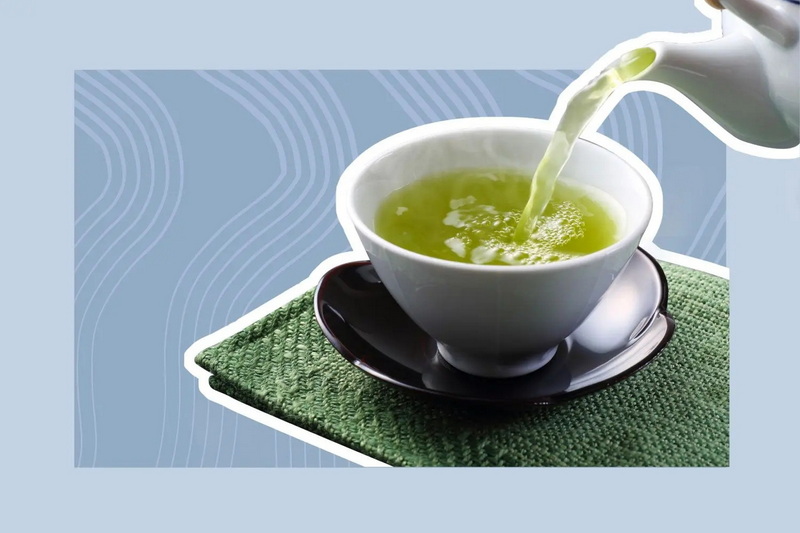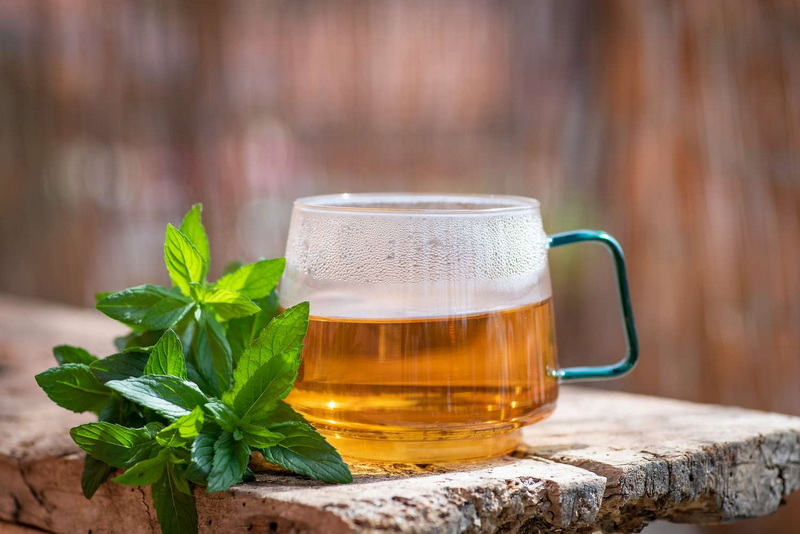Content Menu
● Caffeine Content in Green Tea Extract
● Factors Influencing Caffeine Content
● Health Benefits of Green Tea Extract
● How to Choose Quality Green Tea Extract
● Potential Side Effects
● Comparing Green Tea Extract with Other Sources
● How Much Green Tea Extract Should You Take?
● Conclusion
● FAQs
>> 1. How does the caffeine content in green tea compare to coffee?
>> 2. Can I take green tea extract if I'm sensitive to caffeine?
>> 3. What are the side effects associated with high doses of green tea extract?
>> 4. Is it safe to consume multiple servings of green tea extract daily?
>> 5. How should I store my green tea extract supplements?
● Citations:
Green tea extract has gained popularity as a dietary supplement due to its numerous health benefits, including antioxidant properties, potential weight loss effects, and cognitive enhancement. One of the common concerns among consumers is the caffeine content in green tea extract. Understanding how much caffeine is in a specific amount of green tea extract, such as 100 mg, is crucial for those monitoring their caffeine intake.

Caffeine Content in Green Tea Extract
The caffeine content in green tea extract can vary significantly depending on several factors, including the extraction process, the specific product, and the concentration of active ingredients. Generally, green tea extract contains about 2 to 50 mg of caffeine per serving, but some products can have much higher amounts.
- Typical Caffeine Levels:
- A standard serving of green tea extract (approximately 500 mg) may contain anywhere from 15 to 200 mg of caffeine.
- For instance, a product containing 400 mg of green tea extract might provide around 32 mg of caffeine.
When considering a specific dosage such as 100 mg of green tea extract:
- If we assume an average concentration of caffeine (let's say around 20% caffeine content), then:
Caffeine in 100 mg Green Tea Extract=100 mg×0.20=20 mg
This means that 100 mg of green tea extract could contain approximately 20 mg of caffeine, although this can vary based on the specific formulation and brand.
Factors Influencing Caffeine Content
Several factors influence the caffeine content in green tea extracts:
- Type of Green Tea: Different types of green tea (e.g., matcha, sencha) have varying levels of caffeine. Matcha, for example, tends to have higher caffeine levels compared to other green teas due to its preparation method.
- Extraction Method: The method used to extract the active compounds from the leaves can affect how much caffeine is retained in the final product.
- Brand Variability: Different manufacturers may produce green tea extracts with varying concentrations of active ingredients, including caffeine. It's essential to read labels carefully.
Health Benefits of Green Tea Extract
Green tea extract is not just about caffeine; it also boasts numerous health benefits attributed mainly to its high concentration of antioxidants known as catechins. Here are some notable benefits:
- Antioxidant Properties: Green tea extract is rich in epigallocatechin gallate (EGCG), which has been shown to combat oxidative stress and inflammation in the body. Antioxidants help neutralize free radicals, which can damage cells and lead to chronic diseases.
- Weight Management: Some studies suggest that green tea extract may aid in weight loss by enhancing metabolic rate and fat oxidation. The combination of caffeine and catechins can boost energy expenditure and fat burning during exercise.
- Cognitive Enhancement: The combination of caffeine and L-theanine found in green tea can improve brain function, enhancing focus and attention without the jitteriness often associated with coffee. Research shows that this combination can lead to improved memory and reaction time.
- Heart Health: Regular consumption of green tea has been linked to a reduced risk of heart disease due to its ability to lower cholesterol levels and improve blood vessel function. Studies indicate that drinking green tea regularly may lower LDL cholesterol and triglycerides while boosting HDL cholesterol.
- Diabetes Management: Some research suggests that green tea extract may help regulate blood sugar levels and improve insulin sensitivity, making it beneficial for individuals with type 2 diabetes or those at risk.
How to Choose Quality Green Tea Extract
When selecting a green tea extract supplement, consider the following factors:
- Standardization: Look for products that specify the amount of EGCG or total catechins per serving. This ensures you are getting a consistent dose with each serving.
- Caffeine Content: If you are sensitive to caffeine or trying to limit your intake, check the label for caffeine content per serving.
- Source: Choose extracts sourced from reputable growers who use organic practices. This reduces exposure to pesticides and other harmful chemicals.
- Formulation: Some products combine green tea extract with other ingredients like vitamins or minerals for added benefits. Ensure these combinations align with your health goals.

Potential Side Effects
While green tea extract is generally safe for most people when consumed within recommended dosages, excessive intake can lead to side effects:
- Gastrointestinal Issues: High doses may cause stomach upset or nausea in some individuals. It's advisable to take supplements with food to minimize gastrointestinal discomfort.
- Liver Toxicity: Rare cases have been reported where high doses of concentrated green tea extracts have led to liver damage. It's essential to stick within recommended dosages and consult a healthcare professional if you have pre-existing liver conditions.
- Anxiety and Insomnia: Due to its caffeine content, excessive consumption can lead to increased anxiety or difficulty sleeping. Monitoring your total daily caffeine intake from all sources is crucial.
Comparing Green Tea Extract with Other Sources
To better understand where green tea extract stands regarding caffeine content compared to other common beverages and supplements, consider the following comparison:
| Beverage/Supplement | Serving Size | Approximate Caffeine Content |
| Brewed Coffee | 8 oz | 95-200 mg |
| Espresso | 1 oz | 63 mg |
| Black Tea | 8 oz | 40-70 mg |
| Green Tea | 8 oz | 30-50 mg |
| Green Tea Extract | Varies | Up to 200 mg (500 mg serving) |
| Energy Drinks | 8 oz | 80-150 mg |
This table illustrates that while green tea extract does contain caffeine, it generally has less than coffee and energy drinks but may be comparable or higher than brewed black or regular green teas depending on concentration.
How Much Green Tea Extract Should You Take?
The appropriate dosage of green tea extract can vary based on individual health goals and product formulation. However, general guidelines suggest:
- For weight loss or metabolic benefits: A dosage between 250–500 mg per day is commonly recommended.
- For antioxidant support: A daily intake of around 300–800 mg per day may be beneficial without exceeding safe limits.
It's always best practice to start with a lower dose if you are new to supplements and gradually increase it while monitoring your body's response.
Conclusion
In conclusion, 100 mg of green tea extract typically contains about 20 mg of caffeine, although this figure can vary based on the specific product and its formulation. Understanding this can help individuals manage their overall caffeine intake effectively while enjoying the numerous health benefits associated with green tea extract.
By choosing high-quality products and being mindful of dosage recommendations, users can harness the power of this potent supplement while minimizing potential side effects. As always, consulting with a healthcare professional before starting any new supplement regimen is advisable.

FAQs
1. How does the caffeine content in green tea compare to coffee?
Green tea generally contains less caffeine than coffee. An average cup of brewed coffee has about 95-200 mg of caffeine per 8 ounces, while an equivalent cup of green tea has around 30-50 mg.
2. Can I take green tea extract if I'm sensitive to caffeine?
Yes, but it's advisable to choose products with lower caffeine content or consider decaffeinated options if you are sensitive to stimulants.
3. What are the side effects associated with high doses of green tea extract?
Excessive consumption can lead to side effects such as liver toxicity, anxiety, insomnia, and heart palpitations due to high caffeine content or catechins.
4. Is it safe to consume multiple servings of green tea extract daily?
While moderate intake (300-800 mg per day) is generally considered safe for most adults, it's crucial to monitor total daily caffeine consumption from all sources.
5. How should I store my green tea extract supplements?
Green tea extracts should be stored in a cool, dry place away from direct sunlight to preserve their potency and prevent degradation.
Citations:
[1] https://www.livestrong.com/article/186702-how-much-caffeine-is-in-green-tea-extract/
[2] https://health.clevelandclinic.org/green-tea-extract-a-better-way-to-boost-energy-or-not
[3] https://www.zhounutrition.com/blogs/the-greatness-files/green-tea-extract-q-a
[4] https://pmc.ncbi.nlm.nih.gov/articles/PMC2855614/
[5] https://www.healthline.com/nutrition/10-benefits-of-green-tea-extract
[6] https://www.youtube.com/watch?v=5OlyxaRgabw
[7] https://www.healthline.com/nutrition/caffeine-in-green-tea
[8] https://www.youtube.com/watch?v=CkdqsIhHEhM
[9] https://www.elo.health/articles/green-tea-extract-supplements/
[10] https://www.caffeineinformer.com/caffeine-content/green-tea-extract
[11] https://www.mountsinai.org/health-library/herb/green-tea
[12] https://www.medicalnewstoday.com/articles/269538
[13] https://www.urmc.rochester.edu/encyclopedia/content?contenttypeid=19&contentid=greenteaextract
[14] https://www.canada.ca/en/health-canada/services/food-nutrition/public-involvement-partnerships/notice-modification-list-permitted-supplemental-ingredients-permit-use-green-tea-extract-supplemental-ingredient-foods/document.html
[15] https://www.medicalnewstoday.com/articles/269538
[16] https://www.reddit.com/r/chemistry/comments/3gt1zo/how_much_caffeine_in_green_tea_extract/
[17] https://pubmed.ncbi.nlm.nih.gov/16506807/
[18] https://www.elo.health/articles/green-tea-extract-supplements/
[19] https://pubmed.ncbi.nlm.nih.gov/26065095/
[20] https://hammernutrition.com/blogs/endurance-news-weekly/green-tea-extract-in-fully-charged
[21] https://www.sugimotousa.com/blog/caffeine-in-green-tea
[22] https://www.healthline.com/nutrition/10-benefits-of-green-tea-extract
[23] https://www.caffeineinformer.com/caffeine-content/green-tea-extract
[24] https://www.istockphoto.com/de/bot-wall?returnUrl=%2Fde%2Fphotos%2Fgreen-tea-extract
[25] https://pmc.ncbi.nlm.nih.gov/articles/PMC7922336/
[26] https://stock.adobe.com/search/images?k=green+tea+extract
[27] https://www.youtube.com/watch?v=Q8gBjZ5e3Bs
[28] https://www.youtube.com/watch?v=RIbff5iD0GQ
[29] https://pmc.ncbi.nlm.nih.gov/articles/PMC10930107/
[30] https://www.webmd.com/diet/health-benefits-green-tea
[31] https://si.chenlangbio.com/knowledge/do-green-tea-extract-have-caffeine-
[32] https://www.webmd.com/vitamins/ai/ingredientmono-960/green-tea






























